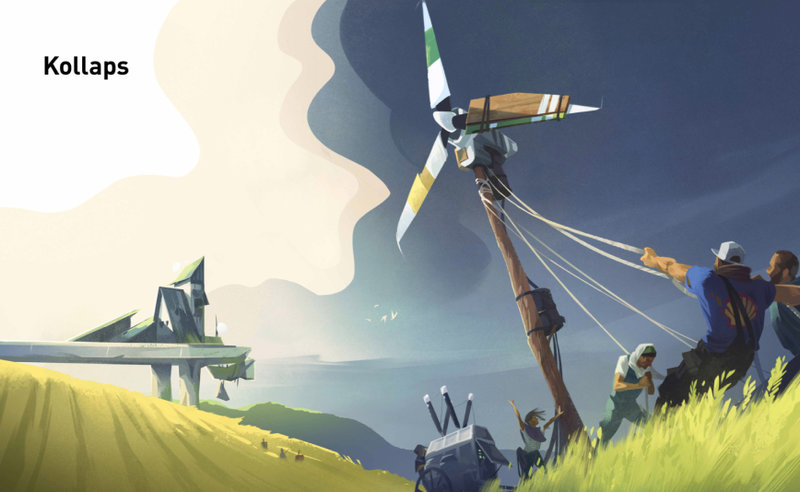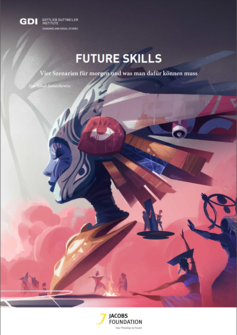Der nachfolgende Text basiert auf einem Auszug aus der GDI-Studie «Future Skills», die über unsere Website bezogen werden können.
Die Zukunft scheint so ungewiss wie schon lange nicht mehr. Eltern und das Bildungswesen, welche Kinder und Jugendliche «fit für die Zukunft» machen sollen, sind besonders herausgefordert. Während über Jahrzehnte von mehr Wohlstand, Fortschritt und Freiheit ausgegangen wurde, scheint die Zeit der Linearität endgültig vorbei.
Aber wie begegnen wir einer sich ständig verändernden Umwelt?
Die neue GDI-Studie «Future Skills» entwirft vier Szenarien für das Jahr 2050 und leitet davon ab, welche Fähigkeiten für diese Zukünfte notwendig sind. Eines davon ist das Kollaps-Szenario.
Ein Kollaps beschreibt einen Niedergang bestehender gesellschaftlicher Ordnung, Institutionen und Infrastrukturen. Im Kollaps-Szenario herrscht nicht nur allgemeiner Mangel auf der Wohlstandsdimension, sondern es sind auch heute bestehende Freiheitsgrade eingeschränkt, da viele Tätigkeiten einfach nicht mehr möglich sind.
Weltweit gibt es eine Vielzahl historischer Beispiele für den Untergang von Zivilisationen: die Bronzezeit-Zivilisationen, die Mayas, das Reich der Khmer, das Mali-Imperium, die Inkas etc. Allen Kollapsen gemeinsam sind ein starker Rückgang der Bevölkerung und eine Verringerung gesellschaftlicher Komplexität. Eine geringere Komplexität bedeutet weniger differenzierte soziale, ökonomische und politische Strukturen und Institutionen, also weniger unterschiedliche kulturelle Artefakte und Gegenstände, weniger unterschiedliche gesellschaftliche Rollen, weniger unterschiedliche Organisationsformen. Eine geringere Spezialisierung und Aufgabenteilung haben den Verlust von Wissen und handwerklichen Fähigkeiten zur Folge.

Die Menschen im Kollaps-Szenario sind weitgehend von der Aussenwelt abgeschnitten. Internationaler Handel findet kaum statt, das Reisen ausserhalb eines kleinen Radius ist zu kostspielig. Auch Migration findet nur noch relativ kleinräumig statt, beispielsweise von Küstennähe ins Landesinnere, wobei Europa seit dem Kollaps als Migrationsziel ohnehin an Attraktivität verloren hat. Gründe für den geringeren Bewegungsradius sind knappe Energie, marode überregionale Transportinfrastruktur wie Strassen oder Zuglinien, unsichere Routen, Misstrauen gegenüber Fremden sowie Strassenzölle als eine der wenigen Möglichkeiten für lokale Autoritäten, Einnahmen zu generieren. Was an überregionalem Austausch übrig ist, findet vielfach per Schiff statt, da der Transport über Seen, Flüsse und Kanäle relativ energiearm erfolgt und wenig Infrastruktur benötigt. Eine Vernetzung besteht teilweise noch digital, etwa durch Computer an öffentlichen Orten und lokale Funknetze. Diese Vernetzung ist aber vor allem lokal brauchbar. Überregionale Verbindungen sind zwar möglich, jedoch langsam und unzuverlässig, da die Glasfaser-Infrastruktur bald nicht mehr funktionierte und durch Kupferkabel und Funkverbindungen ersetzt wurde. Mit dem Wegfall einer überregionalen Vernetzung und Transportinfrastruktur in Form von Informationen und Waren löst sich auch die politische Integration in eine nationale und internationale Ordnung auf. Es gibt keine Autoritäten mehr, die eine überregionale politische Entscheidungsmacht besitzen. Lokale Gemeinschaften sind auf sich al- leine gestellt, sowohl bei der Sicherung der Grundversorgung mit lebensnotwendigen Gütern als auch bei der Organisation des Zusammenlebens.
Welche Fähigkeiten müssen wir in einer Zukunft wie dieser beherrschen?
Die erste Priorität besteht im Überleben, weshalb Survival Skills gebraucht werden wie beispielsweise die Fertigkeit, Feuer zu machen, Wasser zu reinigen oder essbare Beeren und Pilze zu erkennen. Pflanzenkunde ist nicht nur in der freien Natur wichtig, sondern auch, um Landwirtschaft zu betreiben. Dazu sind auch gärtnerische Fähigkeiten nötig.
Für Produktion, Reparatur und Recycling von Möbeln, Häusern, Kleidern etc. sind handwerkliche Fähigkeiten wichtig. Um eine Smartphone- Batterie auszuwechseln, einen Chip irgendwo herauszulöten oder ein Photovoltaik-Panel zu reparieren, braucht es technische Bastelfähigkeiten. Dazu helfen praktische Kenntnisse in Chemie, Physik und Elektronik. Bei Bastelarbeiten mit herausgelöteten Chips oder programmierbaren Mikrocontrollern sind auch Programmierfähigkeiten nützlich. Mit den genannten Fähigkeiten lässt sich etwa eine automatische Bewässerungsanlage für ein Gemüsebeet bauen.
Die Zusammenarbeit in der Gruppe ist überlebenswichtig. Mitglieder der Gemeinschaft müssen in der Lage sein, in der Gruppe Entscheidungen zu treffen und sich in der Gruppe zu koordinieren, um Entscheidungen umzusetzen. Vor allem aber kommt es auf die Bereitschaft an, sich für die Gemeinschaft zu engagieren und auch Unbekannten einen Vertrauensvorschuss zu geben: Das können Unbekannte in der Gemeinschaft sein, aber auch Auswärtige, mit denen man handeln und Wissen teilen könnte.
Wir brauchen also in Zukunft viele verschiedene Fähigkeiten, mit denen wir uns verschiedenen Herausforderungen stellen können. Aber sind dies alle? Welche weiteren Möglichkeiten können die anderen Szenarien aufzeigen? Laden Sie «Future Skills» jetzt kostenfrei herunter!

Studie, 2020 (kostenloser Download)
Sprachen: Deutsch, Englisch, Französisch
Format: PDF, 80 Seiten
Im Auftrag von: Jacobs Foundation